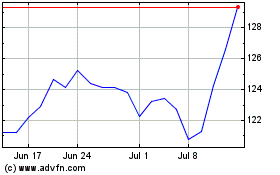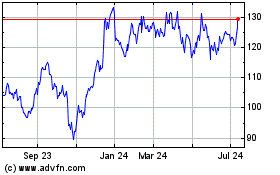By Peter Grant
The badly battered lodging business is stirring to life, roused
by hotel owners and investors betting that bookings will pick up
when Covid-19 vaccines become widespread and more Americans itch to
travel again.
The past year was by many measures the industry's worst, marked
by employee furloughs, plummeting occupancy rates and the
evaporation of most business travel. But this year has already
offered glimmers of hope. Hotel share prices are rising, scores of
properties are reopening and lodging companies are hiring
again.
Blackstone Group Inc. and Starwood Capital Group said Monday
they had teamed up to buy Extended Stay America Inc. for $6
billion. In agreeing to make the largest hotel acquisition since
the start of the coronavirus pandemic, the firms signaled they
expect demand to rise from business travelers.
"The U.S. hotel industry is very slowly regaining solid
footing," said Jan Freitag, national director of hospitality
analytics at CoStar Group Inc., a commercial real-estate data
firm.
Few expect hotels to return to their pre-pandemic level of
business for another two to three years. International travel to
the U.S. collapsed in 2020, and hoteliers hold little hope it will
accelerate much this year. Demand for conventions and large
meetings that have been a staple for many large hotels in downtowns
and resorts also looks grim in 2021.
"We do not expect sustained group demand until herd immunity has
been reached," Mr. Freitag said.
Yet there is recent evidence to support that the worst might be
behind the industry. U.S. hotel occupancy for the week ended March
6 stood at 49%, the highest since October and just a percentage
point lower than the pandemic peak in August, according to hotel
data tracker STR. The rate was about 65% in March 2020 before the
pandemic hit, STR said.
The Baird/STR Hotel Stock Index, which tracks shares of eight
hotel brands and 12 hotel real-estate-investment trusts, jumped 22%
in February, compared with less than a 2% increase for the S&P
500. That gain in the hotel index followed a 31% surge in November,
amid news of the first Covid-19 vaccine coming to market.
"Stocks are pricing in a more optimistic recovery scenario," a
Baird Equity Research report said last week.
Workers are coming back, too. The leisure-and-hospitality
industry added 35,700 jobs in February, the sector's biggest number
since September, according to the Bureau of Labor Statistics.
Leisure travel, often to destinations within drivable distances
of large metro areas, started rebounding last year and continues to
improve. Texas's Galveston Island, where 30 million people are
within a 300-mile radius, expects nearly full hotel occupancy this
week thanks to spring-break crowds, according to Michael Woody,
chief tourism officer for the island's visitor bureau.
More travelers are starting to fly again. Passenger volumes are
40% to 50% below pre-pandemic levels, but airports had their
busiest weekend in a year, according to the Transportation Security
Administration. Nearly 1.36 million people passed through U.S.
airport-security checkpoints on Friday. That was the most in about
a year.
"The airport is getting busier," said Andreas Ioannou, chief
executive of hotel owner Orchestra Hotels + Resorts, whose
properties include the Hilton Fort Lauderdale Beach Resort. "More
people from the Northeast and the Midwest are coming down."
Hotel owners throughout the country are also reporting more
advanced bookings. During most of the pandemic, bookings have been
with just a few days notice, often by people who were going stir
crazy and needed a break.
Now, hotels such as the Admiralty Inn and Suites in Falmouth,
Mass., are taking reservations months in advance. "Some of the
weddings that canceled last year have rebooked," said Eric Zmuda,
general manager of the 98-room lodging.
Marriott International Inc.'s group bookings made in January for
next year and beyond fetched daily rates 11% higher than business
booked a year earlier for stays in 2021 and beyond, according to
Stephanie Linnartz, recently named Marriott's new president. "These
are encouraging signs that there is strong demand for travel in
future years once real progress has been made in containing the
virus," she said on a February earnings call.
Even for beleaguered business travel there are hopeful signs.
The Wednesday-night occupancy rate in the U.S. -- a key metric when
gauging business-traveler demand -- was 46.7% on March 3, compared
with 37.1% on Jan. 6, according to STR.
Most of the business-travel increase is from smaller companies,
said Michael Bellisario, a Baird analyst. "What you're not seeing
is the large companies, the top business-travel accounts, coming
back."
Still, hotels are reopening anticipating growing demand. In
February, only 2.5% of U.S. rooms tracked by STR were closed, down
from 18% in late April, the data firm said.
In New York City, large hotels that plan to reopen in the spring
include the Peninsula, the Mandarin Oriental, and the Ritz-Carlton
overlooking Central Park.
Write to Peter Grant at peter.grant@wsj.com
(END) Dow Jones Newswires
March 16, 2021 05:44 ET (09:44 GMT)
Copyright (c) 2021 Dow Jones & Company, Inc.
Blackstone (NYSE:BX)
Historical Stock Chart
From Mar 2024 to Apr 2024

Blackstone (NYSE:BX)
Historical Stock Chart
From Apr 2023 to Apr 2024
